Digital Resources supported by SC Humanities
Documentaries & Television Shows
Themes include archaeology, African American history, Women's history, South Carolina history, art history, and more. Click to jump to the documentary directory.
Lectures & Panel Discussions
Topics include a World War I Symposium and interviews celebrating Pulitzer Prize winners from South Carolina. Click to jump to the lectures and panel discussions directory.
Online Exhibits & Web Tours
Themes include photography, mental health, monuments, Jewish Heritage, and more. Click to jump to the online exhibits and web tours directory.
Oral Histories
Interviews with former mill workers, Vietnam veterans, South Carolina's women veterans, journalists, Jewish residents of South Carolina, and more. Click to jump to the oral histories directory.
Documentaries & Television Shows
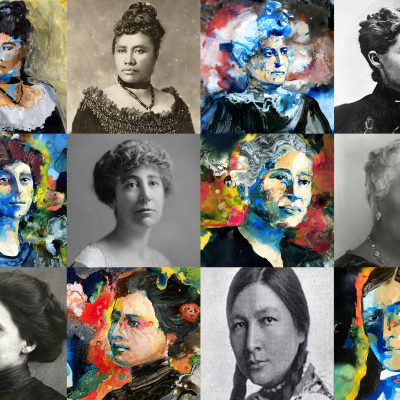
PBS American Masters
From March 4 through August 26, 2020, UNLADYLIKE2020 will be releasing 26 short films and a broadcast hour on PBS American Masters profiling diverse and little-known American women from the turn of the 20th century, and contemporary women who follow in their footsteps.
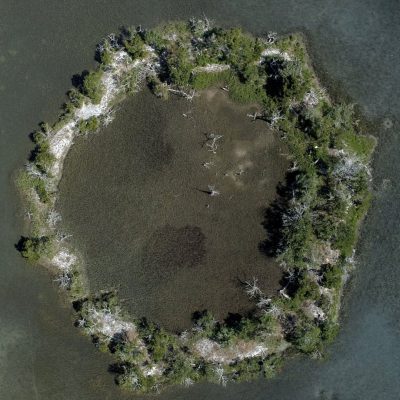
Koelker & Associates
Four thousand years ago, in the time of Stonehenge and the Great Pyramids, an ancient civilization on the South Carolina coast also left behind colossal landmarks. “The Ring People” is a 30-minute documentary that investigates the ancient South Carolinians who created this complex shell ring structure.
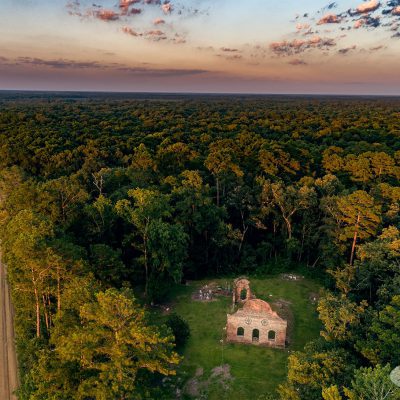
George Wingard
Located in Jacksonboro, SC, the ruin of the brick church represents both religious and civic history of St. Bartholomew’s Parish from the Church act of 1706 through today. The Pon Pon chapel was destroyed by fire in 1801, rebuilt in 1819-1822, and abandoned as a regular worship site in the 1830s. “The Burnt Church” and five other films produced by George Wingard are also available to view on the Savannah River Archaeological Research Program’s website.
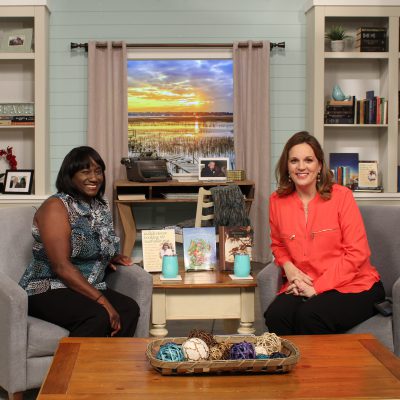
South Carolina ETV
“By The River” is a collaborative television show between SCETV and USC Beaufort. Recorded at the ETV Lowcountry studio in Beaufort, SC, “By The River” is an innovative interview-style show featuring South Carolina and Southern authors. Uniquely, the entire crew for “By the River” consisted of communication studies students at USCB.
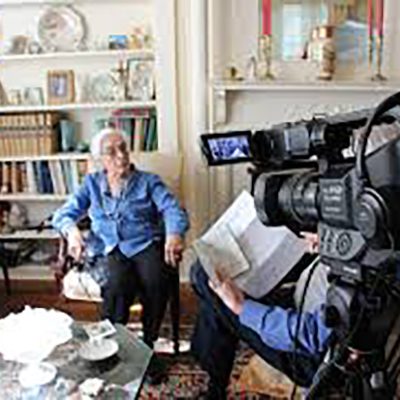
Georgetown County Library
In the late 1800s and early 1900s, a number of Lebanese immigrants settled in Georgetown. Georgetown County Library will honored this facet of local history with an original documentary featuring interviews with members of the local Lebanese-American community. The Georgetown County Library also offers a digital exhibit celebrating the Lebanese Legacy of Georgetown County.
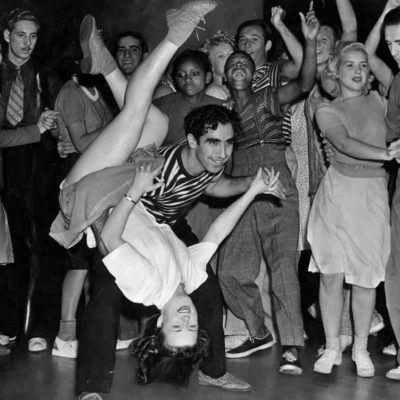
South Carolina ETV
Charlie’s Place tells an important story of race relations in South Carolina and the history of popular music. The owner of the nightclub Charlie’s Place, Charlie Fitzgerald, welcomed blacks and whites to his club, where they danced and listened to music together, defying segregation. Many popular black dances of the era found a white following there, including the famous Myrtle Beach dance, the shag. In 1950, Charlie’s Place was attacked by the Ku Klux Klan, and Charlie Fitzgerald was beaten and left for dead. Although this story has elements of tragedy, it is also the tale of a man who didn’t see color lines and of music that brought people together.
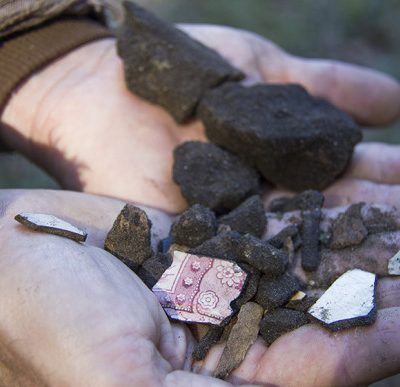
SCDNR Heritage Trust Program
The Fort Frederick Heritage Preserve is a 3-acre property owned by the SC Department of Natural Resources and located in Port Royal in Beaufort County. Archaeological excavations, tabby restoration, and public tours at Fort Frederick Heritage Preserve took place throughout the winter of 2014 – 2015 and were documented through a series of short films, which are now available on the DNR website. Additionally, there are lesson plans, a cultural resources vocabulary list, and a survey available on the DNR website.
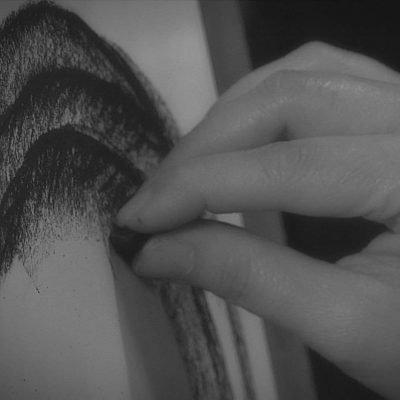
South Carolina ETV
The documentary Georgia O’Keeffe: A Woman on Paper tells the story of Georgia O’Keeffe’s tenure at Columbia College in 1915-1916 and how it was an intense creative period that was a major turning point in the artist’s life. O’Keeffe sent some of her charcoal drawings completed at Columbia College to famous New York artist and gallery owner, Alfred Stieglitz, who responded with enthusiasm, “Finally, a woman on paper.” The documentary was produced in 2015-2016 to mark the 100th anniversary of O’Keeffe’s time as a professor of art at Columbia College.
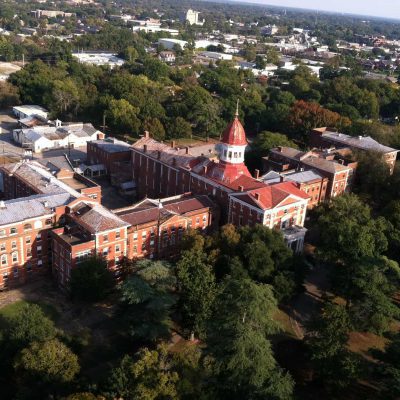
South Carolina ETV
Down on Bull Street is a one-hour documentary produced by SCETV that explores the evolution and history of the SC State Hospital and its struggle to provide services to South Carolina’s mentally ill. The Bull Street facility is layered with a rich and complex history spanning over 190 years. The doors to the Asylum first opened in 1827, offering refuge for the mentally ill in one centralized location in the center of the state.
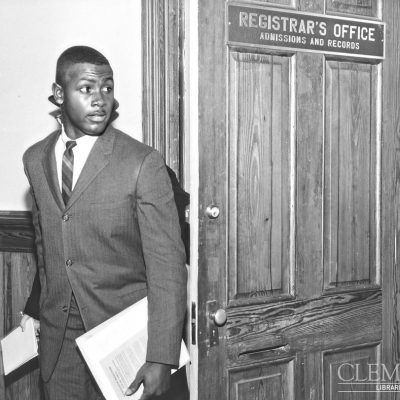
South Carolina ETV
SCETV and ETV Endowment of South Carolina created an original 30-minute documentary titled The Education of Harvey Gantt that tells the story of the peaceful desegregation of Clemson University in 1963. In an era when other Civil Rights accomplishments were heralded by riots, brutality, and drama, the entrance of Harvey Gantt to Clemson University was remarkable for its peace and dignity.
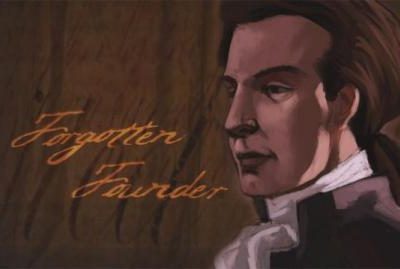
South Carolina ETV
The Forgotten Founder investigates the life of South Carolina statesman Charles Pinckney. Charles Pinckney was Governor of South Carolina, a South Carolina state representative, a United States Congressman, and a delegate to the 1787 Constitutional Convention, where he played an important role in the shaping of the United States Constitution. Despite his impact in early U.S. politics, Pinckney is now little known by South Carolinians, and The Forgotten Founder revives knowledge of his life and career in our state and beyond.
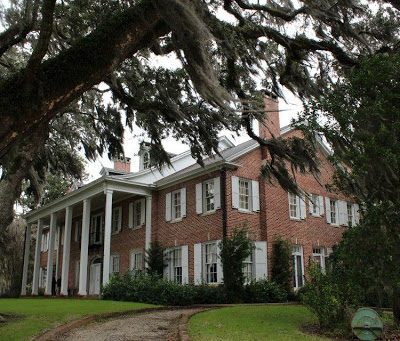
South Carolina ETV
This original 60-minute documentary by SCETV tells the story of Bernard Baruch, one of the most famous and influential Jewish Americans of the first half of the 20th century. Born in Camden, he went on to become an extremely successful businessman, economic advisor to U.S. Presidents Woodrow Wilson and Franklin D. Roosevelt, and philanthropist. He purchased the 17,500 acre property known as Hobcaw Barony in 1905. Later, when environmentalism was still a nascent concept, his daughter Belle created the Belle W. Baruch Foundation in her will, preserving Hobcaw for education, research, and the people of South Carolina.
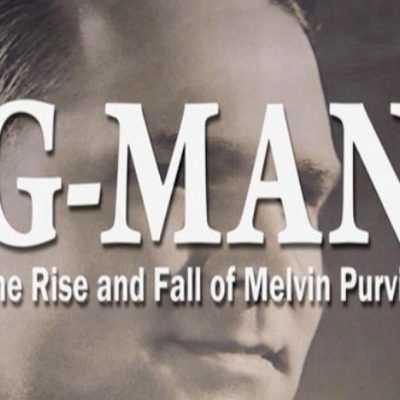
South Carolina ETV
Melvin Purvis, a native of Timmonsville, S.C., became famous in the 1930s as the leader of the FBI team that caught some of the decade’s most notorious criminals, including John Dillinger, Baby Face Nelson, and Pretty Boy Floyd. His death in 1960 from a gun shot wound in the head remains a mystery. G-Man: The Rise and Fall of Melvin Purvis examines the life and death of this interesting South Carolinian and includes interviews with Purvis’ son, Alston, and period re-enactments.
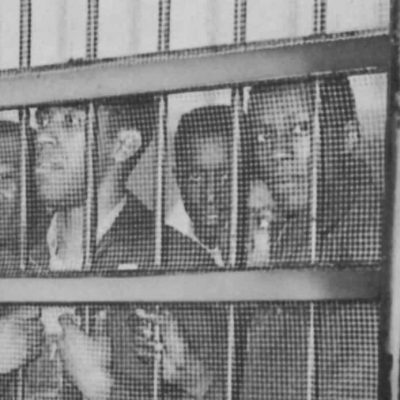
South Carolina ETV
Jail, No Bail tells the story of the “Friendship Nine,” a group of college students from Rock Hill, SC who staged a nonviolent protest against the segregationist practice of not serving African-Americans at a local five-and-dime lunch counter on January 31, 1961. The Friendship Nine were arrested after the protest at McCrory’s lunch counter on Main Street in Rock Hill, and they resolutely refused bail, choosing the 30 days of hard labor at the York County Prison Farm over the $100 fine. This decision of “jail over bail” was a first in the Civil Rights movement and became a strategy that was widely emulated across the country.
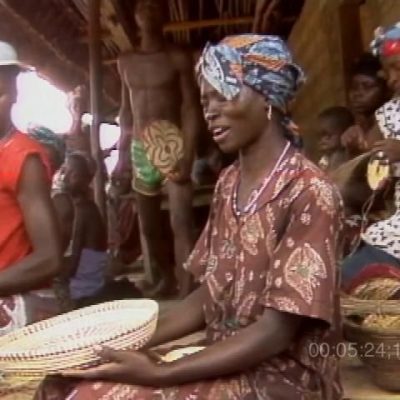
South Carolina ETV
This award-winning program explores the remarkable connections between the Gullah of the South Carolina/Georgia Sea Islands and the people of West Africa, particularly those of Sierra Leone. Taped in South Carolina and Africa, the program traces the truly unparalleled historical connection and continued relationship dating from the time of slavery, and examines the development of the two cultures over the course of time. In 1989, a delegation of African Americans was invited to visit Sierra Leone, West Africa, to reunite with their brothers and sisters who share the same traditions. These traditions have been preserved along the Sea Islands of South Carolina and Georgia. Family Across the Sea was written and produced in 1990 by Tim Carrier.
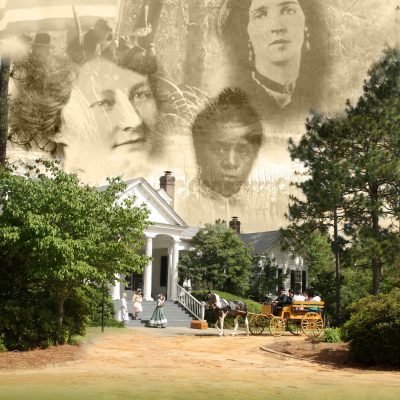
Koelker & Associates
Edgewood: Stage of Southern History examines the house “Edgewood,” built in 1829, and the lives of two famous women who lived there: Lucy Pickens and Eulalie Salley. Edgewood was originally built for secessionist governor Francis W. Pickens in Edgefield District. In the 20th century, Edgewood was home to Eulalie Salley, a major activist and suffragette in South Carolina. Edgewood: Stage of Southern History tells the story of the house and its inhabitants from plantation and Civil War era to the Civil Rights movement.
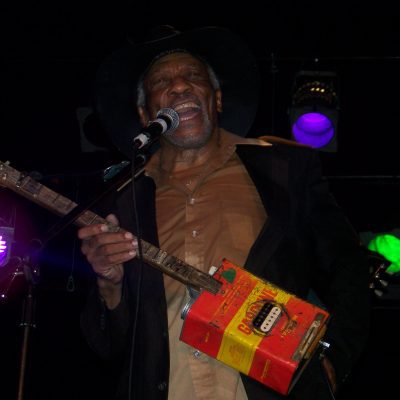
Stan Woodward
A film presentation about SC farmer, blues musician, and former Muddy Waters bass player, Mac Arnold, who grew up playing black gospel, country and rhythm and blues as a child in the region of the state heralded for forming what became known as the Piedmont Blues. Realizing that Mac was sitting on a Southern Americana folk heritage tradition that was important to document and preserve, Woodward began a three-year project that followed Mac and his young band of musicians as he led them back up the blues ladder and returned to the mainstream blues. This is their story.
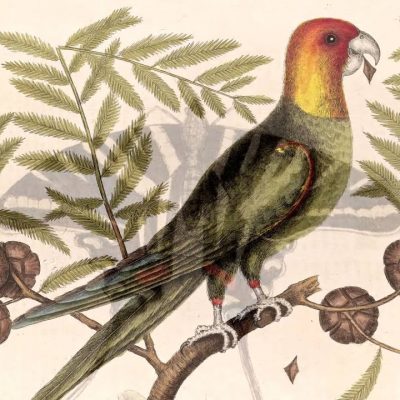
South Carolina ETV
The Curious Mister Catesby is a documentary about the life and works of the little-known 18th century English naturalist and artist, Mark Catesby. Catesby cataloged the flora and fauna of the Carolinas and the Bahamas by gathering seeds and specimens, compiling notes, and making watercolor sketches. Resources includes both volumes of the original book published in 1731. The books contain all his original art work of plant and wildlife specimens completed during his journeys. In addition to the 55-minute documentary, SCETV has provided support materials for Grades 3-12.
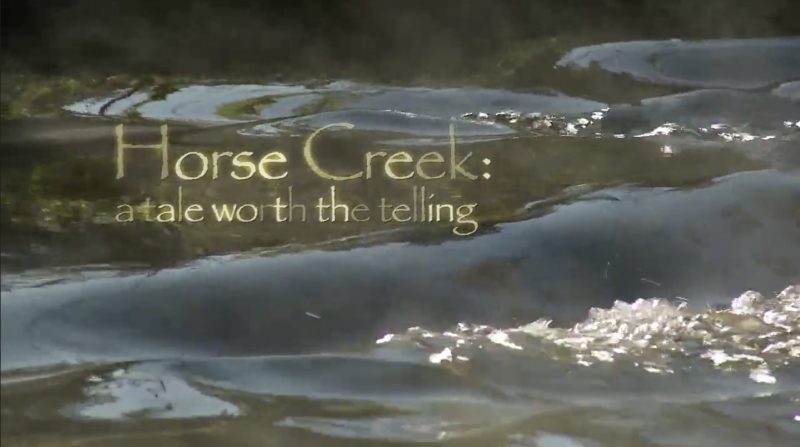
Koelker & Associates
The Aiken County Historical Museum and Storyline Media produced an original, broadcast-length documentary film about the “Horse Creek Valley” region of Aiken County. Horse Creek: A Tale Worth the Telling. Horse Creek Valley is a geographically and socially unique region of the state noted for its mill villages and first public school system. Horse Creek: A Tale Worth the Telling touches on many aspects of the history and culture of the Horse Creek region – from the American Indians who originally lived on the banks of the creek, to the Graniteville Textile Mill owned by entrepreneur William Gregg, to the area’s current development with new industries and growth.

South Carolina ETV
Saving Sandy Island
Saving Sandy Island is a documentary about the struggle to save an exceptional South Carolina island and its Gullah community from development. Home to endangered species and rare long leaf pine forests, Sandy Island is the largest undeveloped freshwater island on the east coast. The program tells the story of the unique coalition of conservationists, state agencies, businessmen and community residents that came together to save this extraordinary place and preserve a historic culture.



South Carolina ETV
Nuestro Futuro (Our Future)
Nuestro Futuro follows five young Hispanics living in South Carolina. Their stories tie into larger themes about the impact of the growing Latino population on communities in the South. How are these recent immigrants being received? What new freedoms do they experience? What new challenges do they face? What do their stories bring to the history of immigration in America?
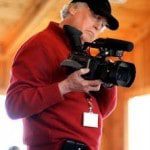

Stan Woodward
Culture & Folklife Documentaries
Since 1975, Stan Woodward has produced Southern culture and folklife documentaries that reflect the weave of the fabric of Southern folk culture. His films thread through many folk heritage traditions deeply rooted in the agrarian South and threatened by massive shifts and changes in today’s society.
Lectures & Panel Discussions
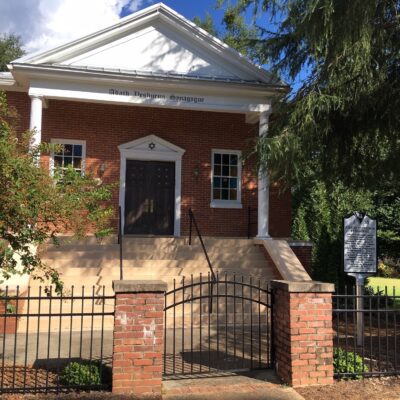

Adath Yeshurun Synagogue
This is the first of two lectures that the Adath Yeshurun Synagogue will present to share the history of the Aiken Jewish community and celebrate the 100th anniversary. This first session focuses on the period from the 1850s to the peak of Jewish Merchant activity in Aiken around 1950. The event was held virtually via Zoom on Sunday, March 21, 2021. The event includes highlights from the “A Source of Light” Exhibit and features speakers from the community who will share their family stories and personal memories.
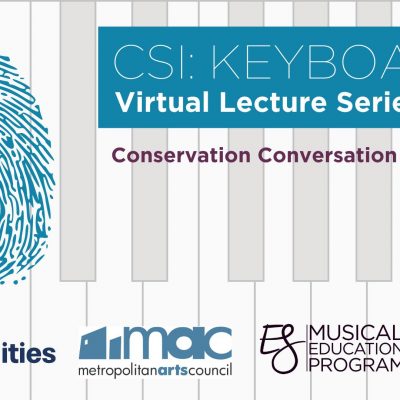

Sigal Music Museum
“CSI: Keyboards” is a virtual lecture series that engages the public in learning about the history of musical instruments, instrument makers, musicians and their historical time periods, and more. SC Humanities supported this programming with a Major Grant.
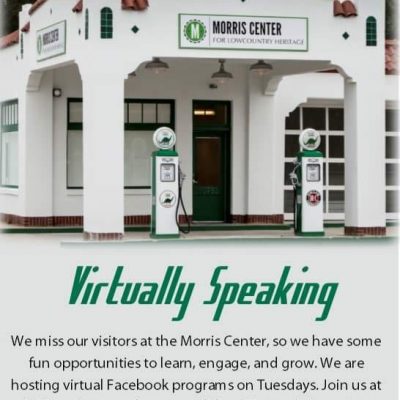

Morris Center for Lowcountry Heritage
Virtually Speaking
The Morris Center for Lowcountry Heritage received a Bridge Emergency Relief Grant from SC Humanities. Funding for the Bridge Grants was provided by the National Endowment for the Humanities as a part of the Coronavirus Aid, Relief and Economic Security (CARES) Act economic stabilization plan. While the Morris Center was closed to visitors, they developed virtual opportunities to learn, engage, and grow. From a panel discussion to conversations on history, art, and race, there are several learning opportunities. The Virtually Speaking videos are also available on Facebook.
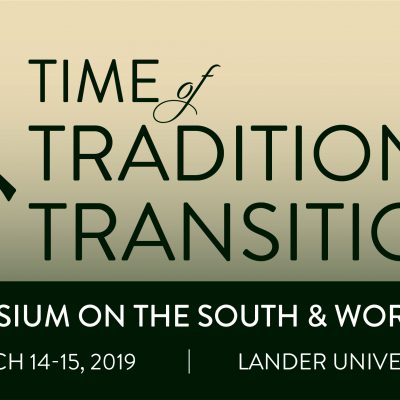

Lander University
Lander University investigated how World War I affected the South in the centennial year of the war’s conclusion through a major symposium titled “Time of Tradition and Transition.” The Symposium included panel discussions by experts on the roles of women in the war effort and in the economy; the U.S. military and foreign policy; race relations; agriculture and food culture; and the South’s economy and later economic development.
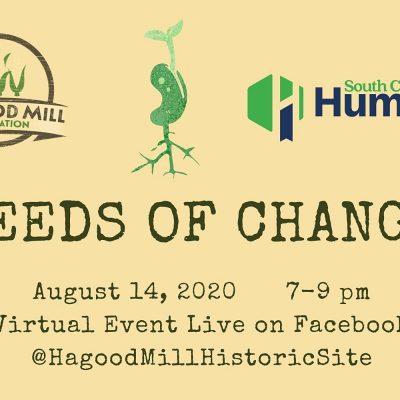

Hagood Mill Historic Site
The Hagood Mill Foundation in Pickens presented a free virtual event exploring the role of the arts in community and the importance of civil dialogue. The “Seeds of Change” event took place on Friday, August 14 from 7:00 – 9:00 p.m. and featured a broad range of guest speakers and a panel discussion with local leaders and descendants of Hagood slave owners and slaves.
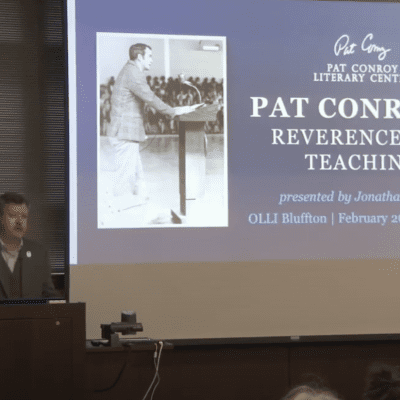

SC Humanities Speakers Bureau
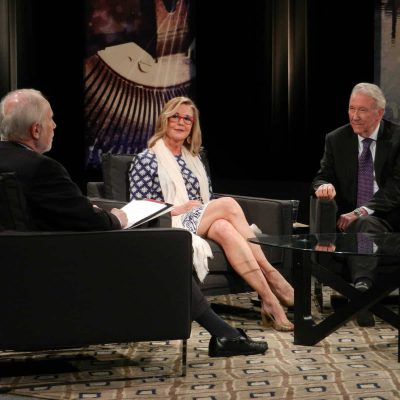

South Carolina ETV
From the Jazz Age to the Digital Age: Pulitzer Prize Winners in South Carolina – Celebrating Pulitzer Commentary with Kathleen Parker and Jim Hoagland, Moderated by Charles Bierbauer. Two Washington Post columnists who have South Carolina connections discuss writing for their columns.
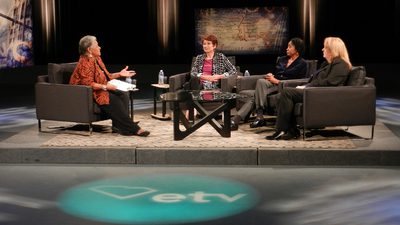

South Carolina ETV
This fascinating discussion examines the significance and lasting impact of the late Julia Peterkin, South Carolina’s only recipient of the Pulitzer Prize in literature. Panelists include Gayla Jamison, producer/director of the documentary Cheating the Stillness: The World of Julia Peterkin; Peterkin scholar Dr. Margaret Washington of Cornell University; and Peterkin biographer Susan Millar Williams, author of “The Devil and a Good Woman Too.”
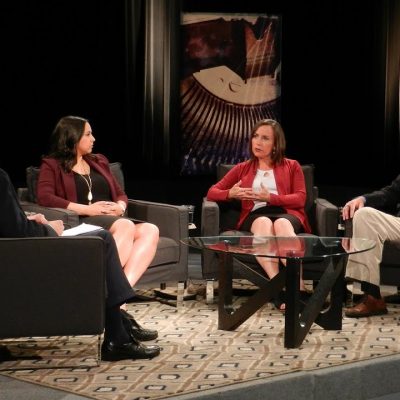

South Carolina ETV
From the Jazz Age to the Digital Age: Pulitzer Prize Winners in South Carolina – Celebrating Pulitzer Public Service Journalism with the Charleston Post and Courier. Journalists Natalie Caula-Hauff, Jennifer Berry Hawes, and Glenn Smith of the Charleston Post and Courier discuss the series, Till Death Do Us Part, published in August 2014. The series won the Pulitzer Prize in Public Service Journalism in 2015.
Online Exhibits & Web Tours
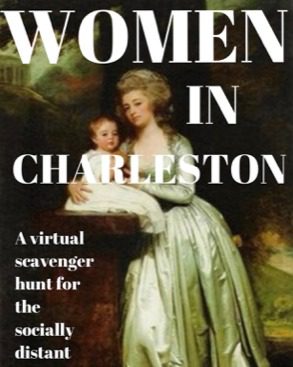

Historic Charleston Foundation
Women in Charleston: A Virtual Scavenger Hunt for the Socially Distant
Charleston’s history is one long tale of fearless women from all walks of life rising to the occasion and getting things done. Take a walk through history and learn more about Charleston’s fascinating women through our Women in History Scavenger Hunt.
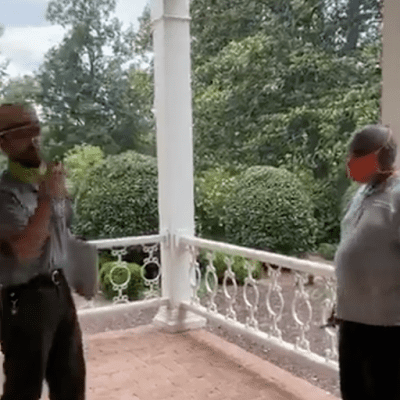

The Slave Dwelling Project & South Carolina State Parks
Virtual Visit & Sleepover at Rose Hill Plantation
South Carolina State Parks and The Slave Dwelling Project created a series of Facebook Live videos to explore the African American experience at Rose Hill Plantation State Historic Site from slavery through Reconstruction and beyond. Joseph McGill, Jr. of The Slave Dwelling Project also recorded Social Distance Learning Part 1, Social Distance Learning Part 2, and The Morning After on Facebook Live.
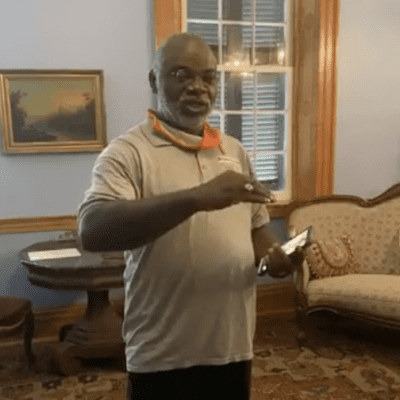

The Slave Dwelling Project & South Carolina State Parks
Virtual Visit & Sleepover at Rose Hill Plantation
South Carolina State Parks and The Slave Dwelling Project created a series of Facebook Live videos to explore the African American experience at Rose Hill Plantation State Historic Site from slavery through Reconstruction and beyond. Discover the history of the site with this virtual house tour led by Park Manager Nate Johnson and Joseph McGill, Jr. of The Slave Dwelling Project.
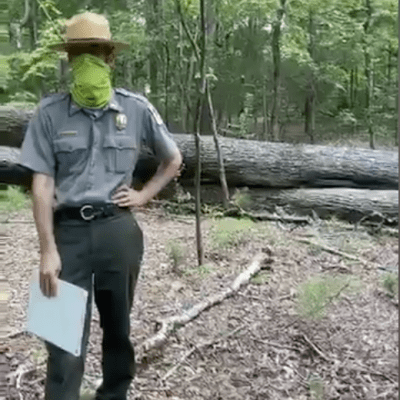

The Slave Dwelling Project & South Carolina State Parks
Virtual Visit & Sleepover at Rose Hill Plantation
South Carolina State Parks and The Slave Dwelling Project created a series of Facebook Live videos to explore the African American experience at Rose Hill Plantation State Historic Site from slavery through Reconstruction and beyond. Discover the history of the site with this tour of the grounds led by Park Manager Nate Johnson and Joseph McGill, Jr. of The Slave Dwelling Project.
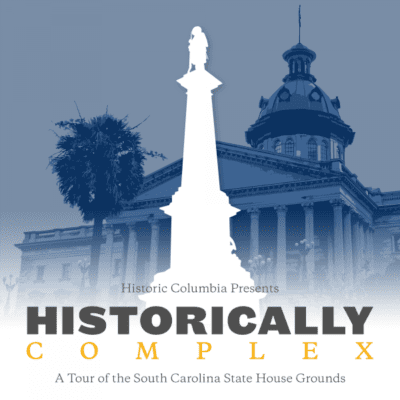

Historic Columbia
Dr. Lydia Mattice Brandt, associate professor of architectural history and art history at the University of South Carolina, is the experienced voice and guide of this narrative-style podcast. Turn the series on in the car, house, or, ideally, while walking the State House grounds and listen to Brandt as she positions each monument in its historical moment. Use our online walking tour to follow along, find your way, or to see historic photographs.
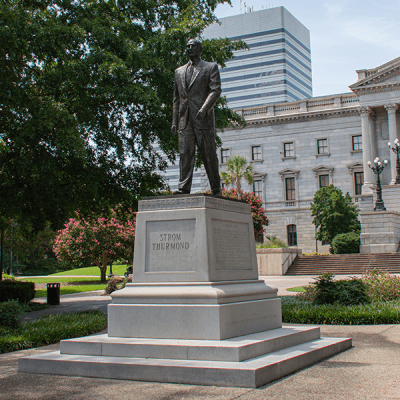

Historic Columbia
Since Columbia’s 1786 founding, the grounds of the South Carolina State House have grown from a 4-acre site bounded by Richardson (Main), Gervais, Assembly, and Senate streets into a 22-acre complex featuring 7 buildings and more than 30 monuments. South Carolinians have constructed, altered, and reconsidered this space for more than 230 years—and continue to do so today. In a project funded by SC Humanities, Historic Columbia explored this site as an historic landscape – one that raises complex questions and encourages thoughtful consideration about what monuments in this public space represent. To provide a baseline of information about the State House Grounds, Historic Columbia created a web-based tour utilizing the comprehensive survey undertaken by architectural historian Lydia Mattice Brandt, Ph.D.
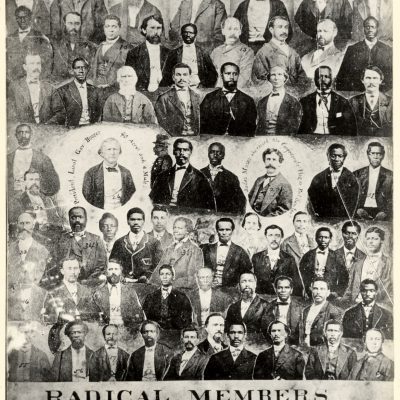

SC Department of Archives & History
South Carolina’s Reconstruction: Restoration, Revolution, Reaction uses the holdings of the SC Department of Archives and History to provide insight into this often misunderstood era. From the Black Codes of 1865, which sought to deny African Americans any of the tangible benefits of citizenship, to the Constitution of 1868, which was drafted by a majority Black delegation, to the Constitution of 1895, which stripped Black men of their right to vote, the exhibit explores both the fleeting experiment in biracial democracy during Reconstruction and the unfulfilled promise of that vision for American Society.
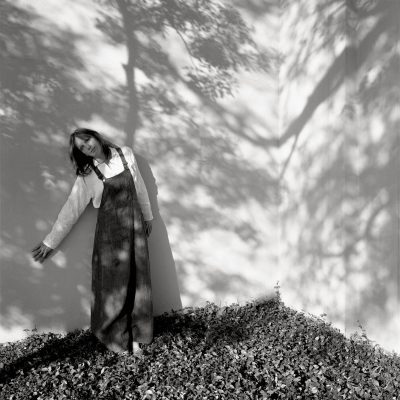

Michael Nye & Midlands Technical College
“Fine Line: Mental Health/Mental Illness” has 46 photographic and audio essay documentaries of individuals struggling with mental health issues. It is a documentary of voices, stories and portraits that confronts stereotypes and reveals the courage and fragility of those living with mental illnesses. Photographer Michael Nye spent four years photographing and recording stories. Schizophrenia, depression, obsessive-compulsive, anxiety and bi-polar disorders are among the experiences considered. The exhibit was on display at the Midlands Technical College Airport Campus as part of a larger event, the “Get Psyched with MTC” Conference, which will include a variety of sessions and workshops for members of the community ranging from mental health professionals to caregivers, students, and the general public.
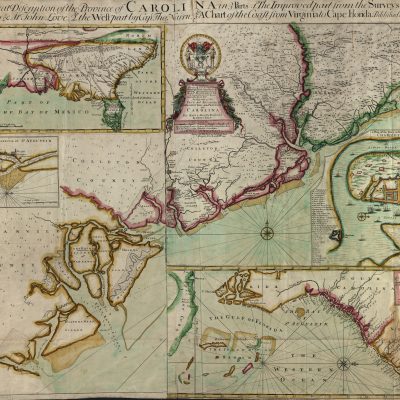

SC Department of Archives & History
The bloodless revolution that occurred in Charles Town in 1719 had a profound impact on South Carolina history that reverberates even to this day, but the event itself has been largely forgotten; a moment of history examined by only the most dedicated scholars. The exhibit “To preserve us from utter ruine”: The Revolution of 1719 offers visitors an understanding of the period of South Carolina history leading up to and including the end of proprietary rule in the colony and its transition to a British royal colony.
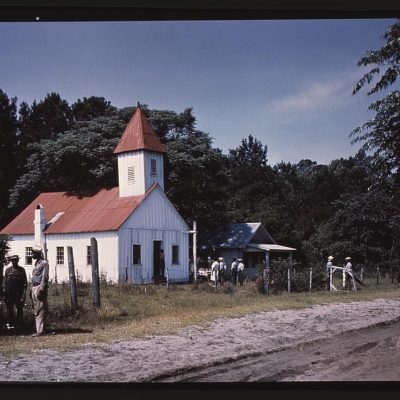

South Carolina ETV
Between the Waters is an interactive website that showcases the cultural history of Hobcaw Barony, a 16,000 acre historical site in Georgetown County. The Between the Waters website gives visitors the opportunity to have a virtual tour of Hobcaw Barony, including the slave dwellings, grand houses, roads, and rice canals. The website includes videos, photographs, and oral histories from former residents and relatives, among other features.
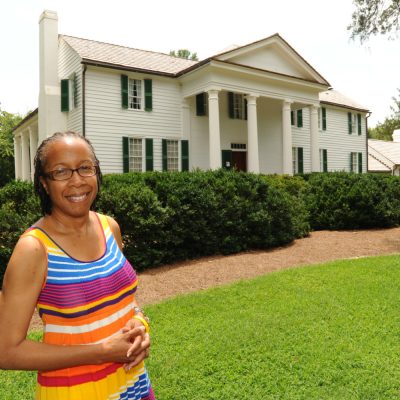

Rhondda R. Thomas
Call My Name: African Americans in Clemson University History
Rhondda R. Thomas is the Calhoun Lemon Professor of Literature at Clemson University whose research focuses on 18th & 19th-century African American literature and American Literature. The Call My Name team researches and documents the stories, acknowledges the contributions, and honors the legacy of six generations of people of African descent at Clemson University
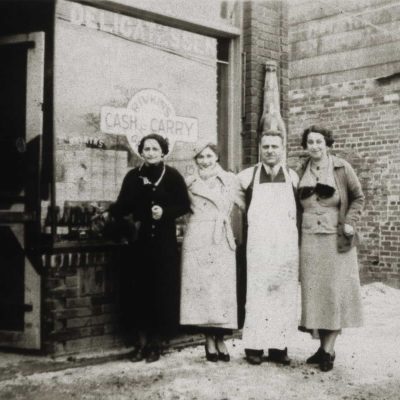

Historic Columbia
The self-guided walking/driving tour brochure explores 34 points of interest in Columbia’s Jewish heritage. Sponsored by Central Carolina Community Foundation, City of Columbia, and SC Humanities, the brochure is also available digitally as a mobile-friendly web-based tour and webpage containing even more information about the history of the Jewish community in the capital city.
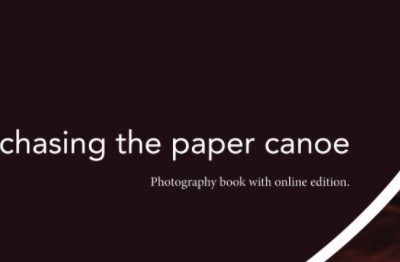

Athenaeum Press
Chasing the Paper Canoe
Chasing the Paper Canoe was the inaugural publication of the Athenaeum Press. The book and accompanying digital publication paint the picture of Nathaniel Bishop’s journey down the Waccamaw River more than a century ago. The project investigate how the landscape has changed, what has stayed the same, and investigate how the river has shaped this region.
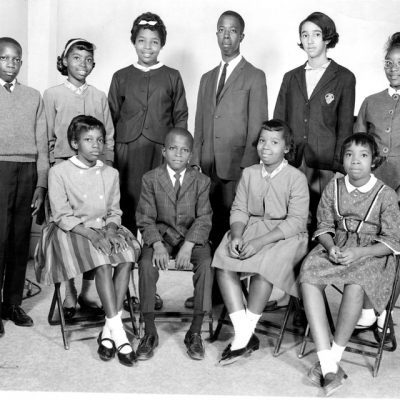

Lowcountry Digital History Initiative
The Somebody Had To Do It initiative was launched in 2006 as a collaborative, multi-institutional project to identify and collect oral histories from individuals who were the first Black students to integrate all-White schools during the twentieth-century civil rights movement. Somebody Had To Do It examines the history of school desegregation in South Carolina and the U.S. South. This online exhibition features oral histories with Black Americans who were the “first children” to integrate public schools in the mid-twentieth century.
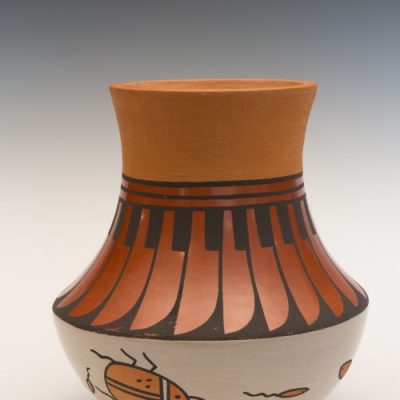

Abbeville County Library
The Dr. Samuel R. Poliakoff Collection of Western Art
The Abbeville County Library’s unique Poliakoff Collection of Western Art is accessible online with expert-prepared descriptions. The collection contains 130-plus objects, including Western American Indian-themed bronzes, pottery, tapestries and paintings by some of the most prominent late-20th century Western Native American artists. The collection was a 1990 bequest by the late Dr. Samuel R. Poliakoff, an Abbeville native who acquired art objects in the 1980s from artists in Arizona, New Mexico and other Western states. The e-catalog features captions and essays prepared by a humanities scholar, Dr. Bruce David Bernstein, a PhD. in anthropology who resides in Santa Fe, NM.
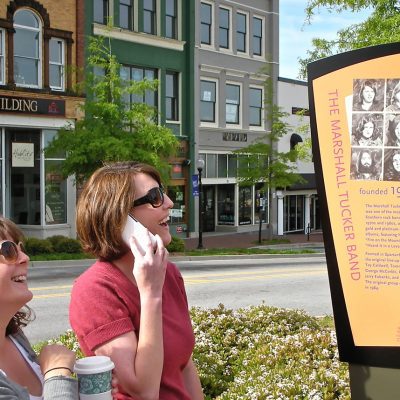

City of Spartanburg, Hub-Bub.Com, and Hub City Writers Project
The Spartanburg Music Trail features signage and an audio tour honoring 12 prominent musicians and groups that have a connection to the Spartanburg area. The Spartanburg Music Trail has a content-rich, interactive website with information about the selected musicians as well as music and video clips.
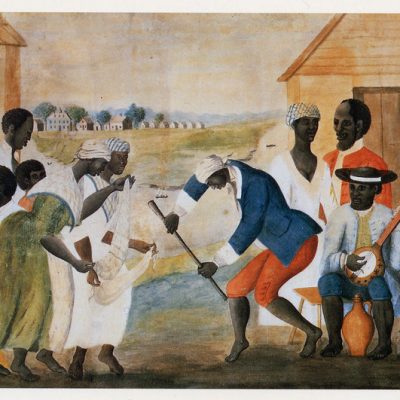

Lowcountry Digital History Initiative
African Passages, Lowcountry Adaptations
African Passages, Lowcountry Adaptations (APLA) is an online exhibition about the systems of chattel slavery and plantation agriculture that developed in the Atlantic World, and that would come to define race, class, and labor experiences in Charleston and the surrouding South Carolina Lowcountry region from the seventeenth to the nineteenth centuries. After Emancipation, legacies of race and class inequalities that stemmed from slavery continue to be a struggle into the present.
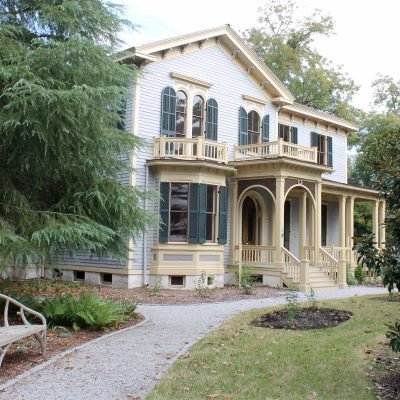

Historic Columbia
Historic Columbia Foundation created an online “virtual tour” of several key rooms in the historic Woodrow Wilson Family Home in downtown Columbia. Online visitors can tour the passage/butler’s pantry, the main pantry, the water closet, and the bathing room and understand how they were used in the 19th century by the Wilson family and their staff.
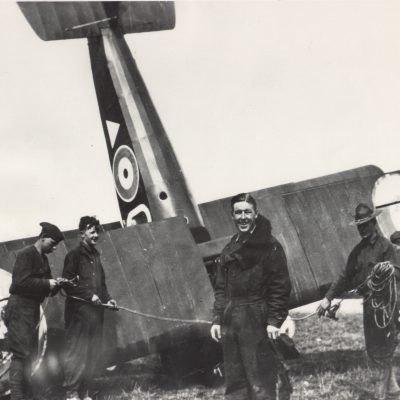

City of Spartanburg, Hub-Bub.Com, and Hub City Writers Project
War Birds: Diary of an Unknown Aviator is a 57-minute documentary that tells the story of three young Americans from the South who volunteered as pilots in World War 1: Elliott White Springs of South Carolina, John McGavock Grider of Arkansas, and Lawrence Callahan of Kentucky. The documentary is not available for free viewing, but the film’s website offers historical context and photo galleries.
Oral Histories
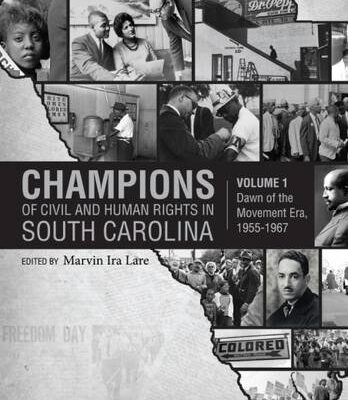

Champions of Civil and Human Rights in South Carolina is a five-volume anthology spanning the decades from 1930 to 1980 with oral history interviews of key activists and leaders of the civil rights movement in South Carolina. The Department of Oral History, University Libraries, University of South Carolina has worked to migrate these envisioned book volumes into an online oral history exhibit, giving access to both the transcripts and sound recordings of the interviews.


Presbyterian College coordinated an oral history project about “Workforce Development at Clinton and Lydia Textile Mills, 1961-1990.” Transcripts of 24 oral histories, 50 condensed audio narratives, and two thematic exhibits featuring narrative selections were published for public access.
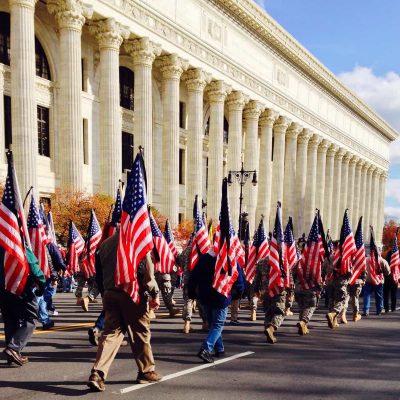

The Upcountry History Museum
The Vietnam Veterans Oral History Project unites diverse communities around a common purpose: collect, preserve, and make accessible the personal accounts of American war veterans so that current and future generations can hear directly from veterans and better understand the realities of war. There are over 1,500 Vietnam veterans in South Carolina today.
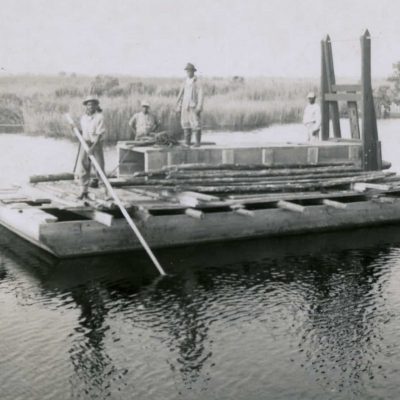

The Village Museum & The South Carolina Historical Society
The Village Museum in McClellanville in partnership with the South Carolina Historical Society conducted a major oral history project on “Voices of the Santee Delta.” The Santee Delta is an important biological and historic area, and the collected oral histories are archived at the South Carolina Historical Society and online via the Lowcountry Digital Library. The Santee Delta was once the location of an important section of the Rice Kingdom and an enslaved labor force whose descendants have provided a lasting Gullah culture. The voices of this community are diverse in ethnicity and occupation and include biologists, fisherman, property managers, and many others.
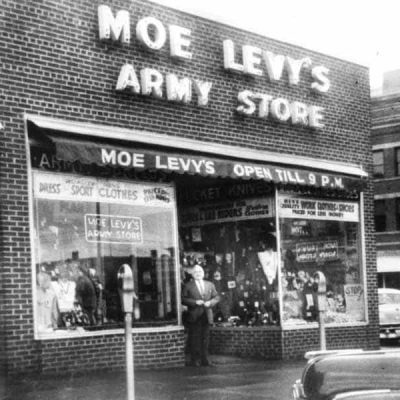

Historic Columbia
The Jewish Heritage Collection Oral Histories, archived in Special Collections at the College of Charleston’s Addlestone Library, offer an inside perspective on the lives of Jewish residents of South Carolina’s cities and small towns. The majority of interviews focus on first- and second-generation Americans of the twentieth century, and address topics such as immigration, assimilation, antisemitism, Jewish/African-American relations, making a living, and religious life. The collection also includes interviews with World War II liberators and survivors of the Holocaust who have come to live in South Carolina, as well as a variety of presentations and panel discussions that cover subjects relevant to the history of Jewish South Carolinians.
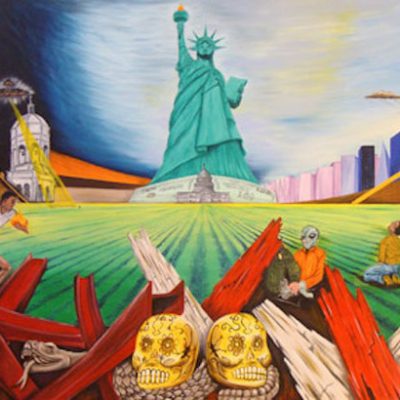

The Citadel Oral History program
“Las Voces Del Lowcountry” documents the diverse experiences of Latinos who make the Charleston-area their home. The project raises the profile of Latinos in the Lowcountry and in the state while deepening the public’s understanding of the social and historical forces that have led to their arrival, to encourage thoughtful discussion of immigration, employment, education and other issues of central importance to Latinos, and to help speed the political and social maturation of the Latino communities of the Lowcountry so that they enjoy the basic human rights to which they are entitled.
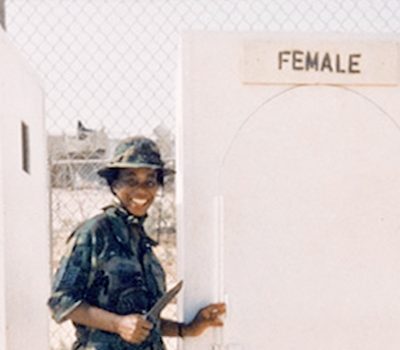

UofSC Center for Digital Humanities
“Always Coming Home: South Carolina Female Veterans” is an oral interview and documentary project that investigates the experience of women veterans in South Carolina. Based on more than fifty interviews with SC women veterans of World War II through today’s conflicts, this project is designed to give a public voice to the increasing numbers of women whose return to civilian life has been affected by diverse combat situations, but who have had little opportunity to share their experiences with the public.


SC Press Association
The South Carolina Press Association partnered with the USC School of Journalism and Mass Communications to do a major oral history project that captured video and audio interviews of some of South Carolina’s leading newspaper journalists from the last half century. Journalists have behind-the-scenes insight into the culture and values of the time. In addition to recalling stories from the past, the project interviewed journalists who have covered significant events and political figures in our state’s history.